Open broadcast DotNext 2017 Piter: Jon Skeet, Sasha Goldshtein and Andrey Akinshin live
We continue our cycle of open broadcasts for everyone to spend Saturdays with benefit! Before that, we were broadcasting with Mobius 2017 and JPoint 2017 (access to it has already been closed, sort of). This time we have something interesting for .NET developers .
Today at 10 am, the free YouTube broadcast of the first track DotNext 2017 Piter will begin!
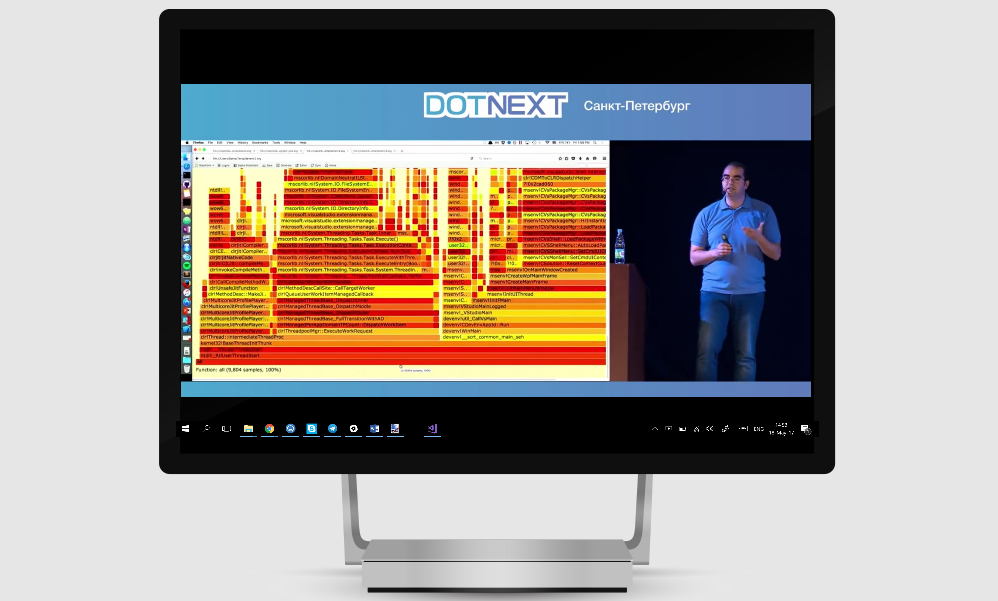
')
The first track is the largest and most popular among our participants, which means speakers and topics are relevant. Rate yourself:
In addition, at 10:10 in the morning you can watch live interviews with John Skit, as well as five more interviews with our other speakers. Will be cool!
Link to YouTube-broadcast under the cat.
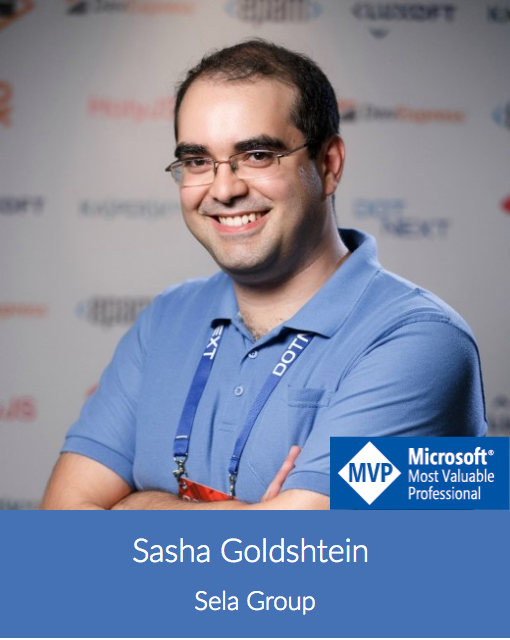 10: 30-11: 30 Sasha goldshtn Goldshtein - The Performance Investigator's Field Guide
10: 30-11: 30 Sasha goldshtn Goldshtein - The Performance Investigator's Field Guide
After conducting a hundred performance studies, you will begin to turn out your patterns in working with productivity, saving time and energy on finding a problem. In this report, Sasha will talk about his experience of working with the productivity gained over the years of working on completely different projects and the tools he used.
First of all, we consider the anti-methods for performance investigations and the checklist designed to find bottlenecks in Windows and .NET applications. After that, Sasha will go to the overview of the ideal tool for analyzing performance and show how close to ideal applications are available today: first of all, it’s about Event Tracing for Windows, but apart from him Sasha will show some of his own open source developments, which he previously reports are not presented.
At the end of the report we will talk about deshboards and visualization, as well as unobvious errors that can be made while working with statistical data. Along the way, you will see several of the most difficult tasks that the speaker has decided in his lifetime.
 12: 00-13: 00 Jon Skeet - The changing state of immutability C #
12: 00-13: 00 Jon Skeet - The changing state of immutability C #
A report on what immutability is, what its advantages are and how it developed in C #. In addition, we will talk about the various options for implementing the immutability of objects / states, their pros and cons (especially in cases where the language or platform does not encourage it), as well as what will happen to this concept in the future.
 13: 30-14: 30 Tomas Herceg - Entity Framework Core: Is It Ready Yet?
13: 30-14: 30 Tomas Herceg - Entity Framework Core: Is It Ready Yet?
This report is intended for those who have not yet worked with the Entity Framework Core, but would like to try. It will discuss the differences between the Entity Framework and the Entity Framework Core, as well as which framework to choose for your project. Let's discuss the Entity Framework Core features that Thomas will show in demos on different DBMSs under Linux.
In addition, we will take a look at the project roadmap, discuss what to expect in the future and whether all this is ready for production.
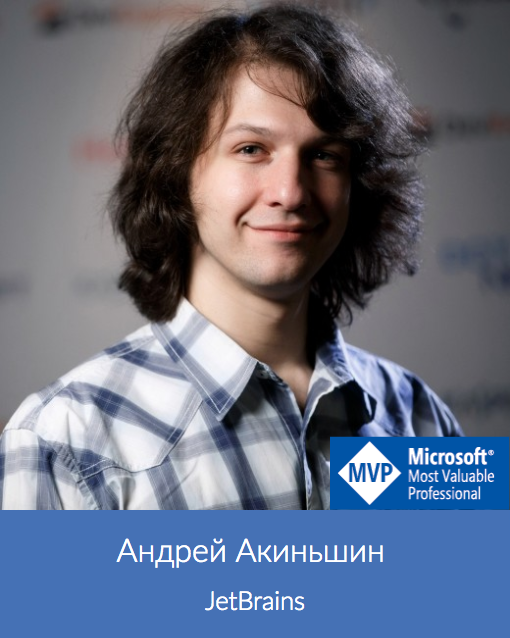 15: 15-16: 15 Andrew DreamWalker Akinshin - Let's talk about memory
15: 15-16: 15 Andrew DreamWalker Akinshin - Let's talk about memory
In many modern applications, performance rests on memory. Measuring the speed of work and writing the correct benchmarks in this case is not so simple: too many factors affect the total running time. In this report we will talk about what makes up the performance of working with memory.
We will discuss both low-level hardwares (CPU cache and its associativity, alignment, store forwarding, 4K aliasing, prefetching, cache / page splits, cache bank conflicts, etc.) and more .NET-specific problems (pinned objects, large object heap, features of the heap in the full. NET Framework and Mono).
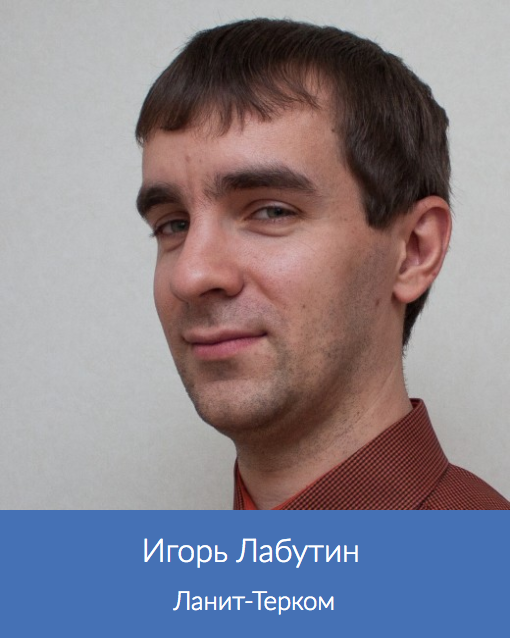 16: 45-17: 45 Igor Labutin - Interprocess conversations: causes and methods
16: 45-17: 45 Igor Labutin - Interprocess conversations: causes and methods
More and more modern applications go beyond the simple “one process” model. Developers find many reasons why one process is not enough. And if there are several of them, there is a problem of transferring information between them. .NET provides several ways to organize this interaction. We will look at where the task of communicating processes may appear, discuss ways to solve it, and also make sure that not all methods are equally convenient and useful.
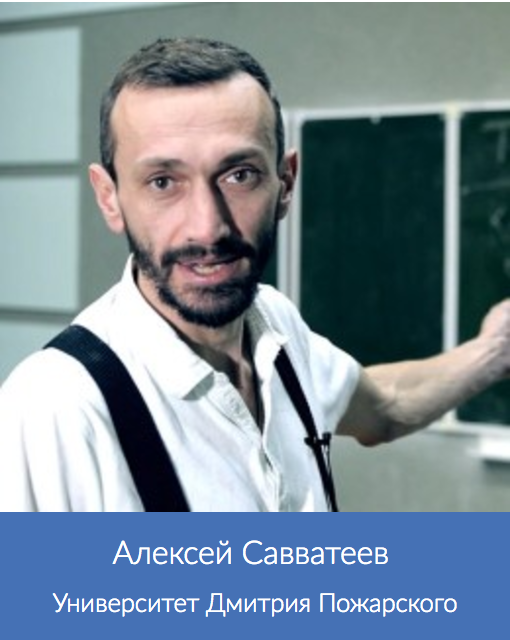 18: 15-19: 15 Alexey Savvateev - The task of collective responsibility
18: 15-19: 15 Alexey Savvateev - The task of collective responsibility
The steep keyout that exploded the scene at the JPoint 2017 comes to St. Petersburg on DotNext!
Imagine that you are a police officer on duty in the turnstile hall. The free-riders try to jump through the turnstiles, you catch them. You are one, they are many. Is it possible for them to set such “rules of the game” so that they do not dare to try to jump, even if you know in advance that you will catch only one of them in any case? It turns out possible.
A report on mathematics and game-theoretical foundations that stand behind the invention of various ingenious control algorithms. In this report, you will not get an academic education, you will not learn how to write more efficient algorithms. However, you get an idea of how rich the mathematical apparatus exists.
If you are interested in the topic of game theory, if you are interested in learning about research, for which you have already been awarded the Nobel Committee for Economics award several times, then welcome to the report.
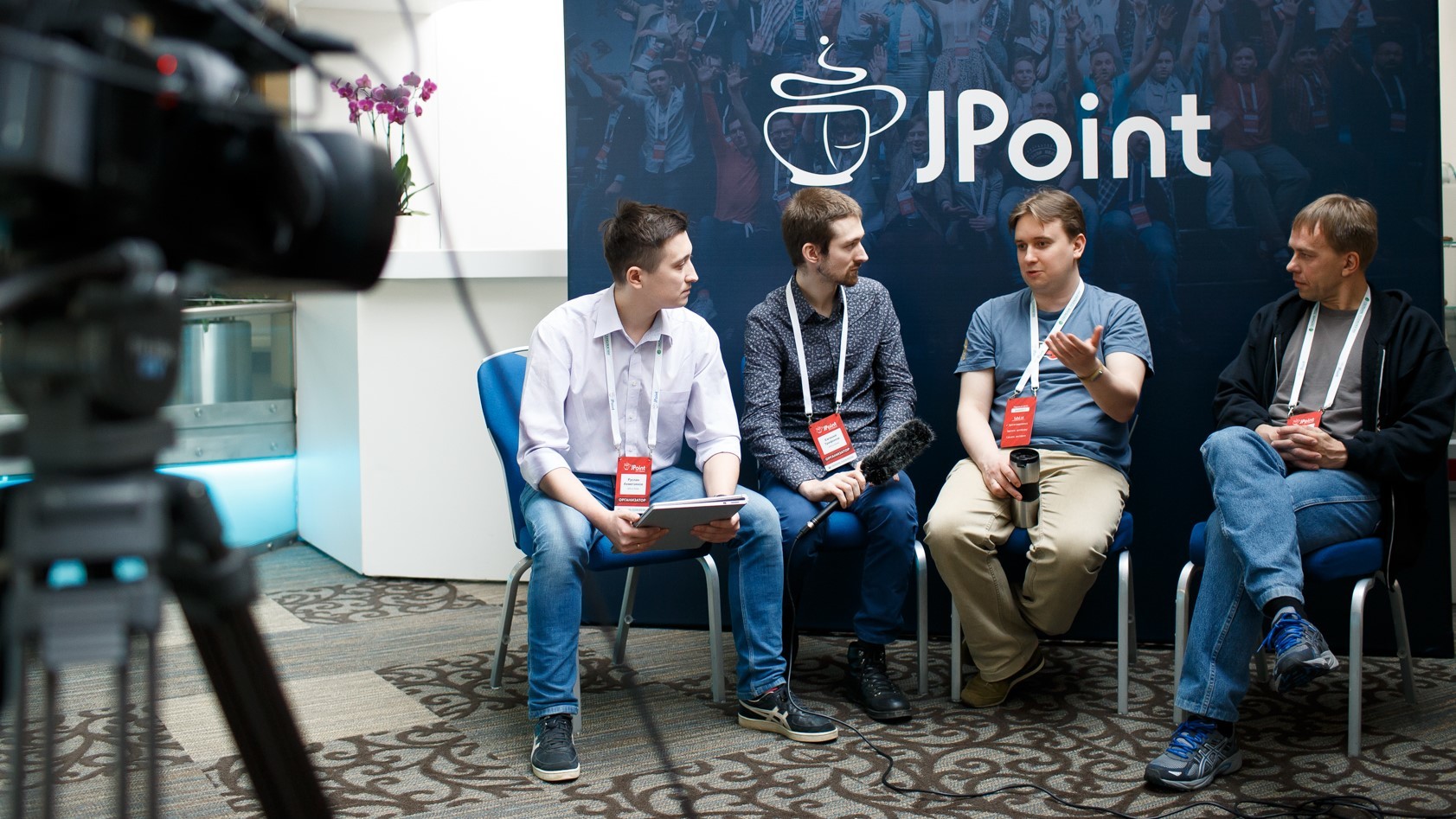
The problem of many online broadcasts - empty breaks and coffee breaks. While the participants at the conference are drinking coffee and talking to the speakers, viewers of the broadcast are forced to look at the stubs and wait for the next report to begin.
We solved this problem in our own way - during the breaks events at the conference will be broadcast, as well as interviews with speakers. I'll be interviewing along with phillennium - you won't be bored. Questions, if they suddenly arise, can be asked in the Telegram-channel of the conference: t.me/dotnextconf
Today at 10 am, the free YouTube broadcast of the first track DotNext 2017 Piter will begin!

')
The first track is the largest and most popular among our participants, which means speakers and topics are relevant. Rate yourself:
- Sasha goldshtn Goldshtein - The Performance Investigator's Field Guide
- Jon Skeet - The changing state of immutability C #
- Tomas Herceg - Entity Framework Core: Is It Ready Yet?
- Andrey DreamWalker Akinshin - Let's talk about memory
- Igor Labutin - Interprocess conversations: causes and methods
- Alexey Savvateev - The task of collective responsibility
In addition, at 10:10 in the morning you can watch live interviews with John Skit, as well as five more interviews with our other speakers. Will be cool!
Link to YouTube-broadcast under the cat.
Track program
 10: 30-11: 30 Sasha goldshtn Goldshtein - The Performance Investigator's Field Guide
10: 30-11: 30 Sasha goldshtn Goldshtein - The Performance Investigator's Field GuideAfter conducting a hundred performance studies, you will begin to turn out your patterns in working with productivity, saving time and energy on finding a problem. In this report, Sasha will talk about his experience of working with the productivity gained over the years of working on completely different projects and the tools he used.
First of all, we consider the anti-methods for performance investigations and the checklist designed to find bottlenecks in Windows and .NET applications. After that, Sasha will go to the overview of the ideal tool for analyzing performance and show how close to ideal applications are available today: first of all, it’s about Event Tracing for Windows, but apart from him Sasha will show some of his own open source developments, which he previously reports are not presented.
At the end of the report we will talk about deshboards and visualization, as well as unobvious errors that can be made while working with statistical data. Along the way, you will see several of the most difficult tasks that the speaker has decided in his lifetime.
 12: 00-13: 00 Jon Skeet - The changing state of immutability C #
12: 00-13: 00 Jon Skeet - The changing state of immutability C #A report on what immutability is, what its advantages are and how it developed in C #. In addition, we will talk about the various options for implementing the immutability of objects / states, their pros and cons (especially in cases where the language or platform does not encourage it), as well as what will happen to this concept in the future.
 13: 30-14: 30 Tomas Herceg - Entity Framework Core: Is It Ready Yet?
13: 30-14: 30 Tomas Herceg - Entity Framework Core: Is It Ready Yet?This report is intended for those who have not yet worked with the Entity Framework Core, but would like to try. It will discuss the differences between the Entity Framework and the Entity Framework Core, as well as which framework to choose for your project. Let's discuss the Entity Framework Core features that Thomas will show in demos on different DBMSs under Linux.
In addition, we will take a look at the project roadmap, discuss what to expect in the future and whether all this is ready for production.
 15: 15-16: 15 Andrew DreamWalker Akinshin - Let's talk about memory
15: 15-16: 15 Andrew DreamWalker Akinshin - Let's talk about memoryIn many modern applications, performance rests on memory. Measuring the speed of work and writing the correct benchmarks in this case is not so simple: too many factors affect the total running time. In this report we will talk about what makes up the performance of working with memory.
We will discuss both low-level hardwares (CPU cache and its associativity, alignment, store forwarding, 4K aliasing, prefetching, cache / page splits, cache bank conflicts, etc.) and more .NET-specific problems (pinned objects, large object heap, features of the heap in the full. NET Framework and Mono).
 16: 45-17: 45 Igor Labutin - Interprocess conversations: causes and methods
16: 45-17: 45 Igor Labutin - Interprocess conversations: causes and methodsMore and more modern applications go beyond the simple “one process” model. Developers find many reasons why one process is not enough. And if there are several of them, there is a problem of transferring information between them. .NET provides several ways to organize this interaction. We will look at where the task of communicating processes may appear, discuss ways to solve it, and also make sure that not all methods are equally convenient and useful.
 18: 15-19: 15 Alexey Savvateev - The task of collective responsibility
18: 15-19: 15 Alexey Savvateev - The task of collective responsibilityThe steep keyout that exploded the scene at the JPoint 2017 comes to St. Petersburg on DotNext!
Imagine that you are a police officer on duty in the turnstile hall. The free-riders try to jump through the turnstiles, you catch them. You are one, they are many. Is it possible for them to set such “rules of the game” so that they do not dare to try to jump, even if you know in advance that you will catch only one of them in any case? It turns out possible.
A report on mathematics and game-theoretical foundations that stand behind the invention of various ingenious control algorithms. In this report, you will not get an academic education, you will not learn how to write more efficient algorithms. However, you get an idea of how rich the mathematical apparatus exists.
If you are interested in the topic of game theory, if you are interested in learning about research, for which you have already been awarded the Nobel Committee for Economics award several times, then welcome to the report.
Broadcast in the breaks

The problem of many online broadcasts - empty breaks and coffee breaks. While the participants at the conference are drinking coffee and talking to the speakers, viewers of the broadcast are forced to look at the stubs and wait for the next report to begin.
We solved this problem in our own way - during the breaks events at the conference will be broadcast, as well as interviews with speakers. I'll be interviewing along with phillennium - you won't be bored. Questions, if they suddenly arise, can be asked in the Telegram-channel of the conference: t.me/dotnextconf
Restrictions
- Since the broadcast is free, it is provided on the principle of as is : we are sure that everything will be fine, but if that happens, do not blame me!
- There will be no video recordings. That is, they, of course, will be, but only for conference participants who have left feedback. And for all the others, we traditionally post them in 3-4 months.
- You cannot watch what happens in other halls. And there will be many interesting things . Next time register and watch everything without restrictions.
Source: https://habr.com/ru/post/328984/
All Articles